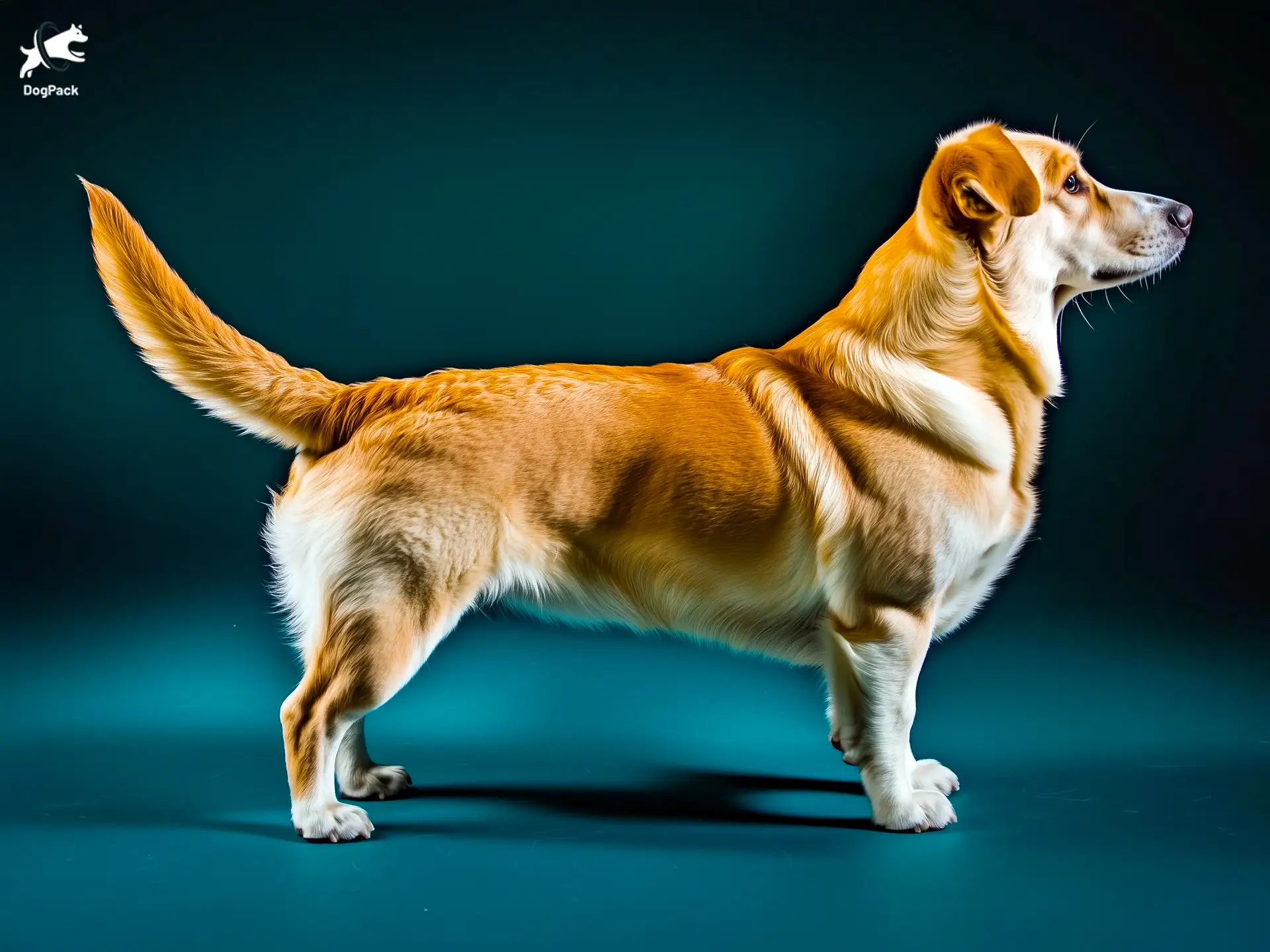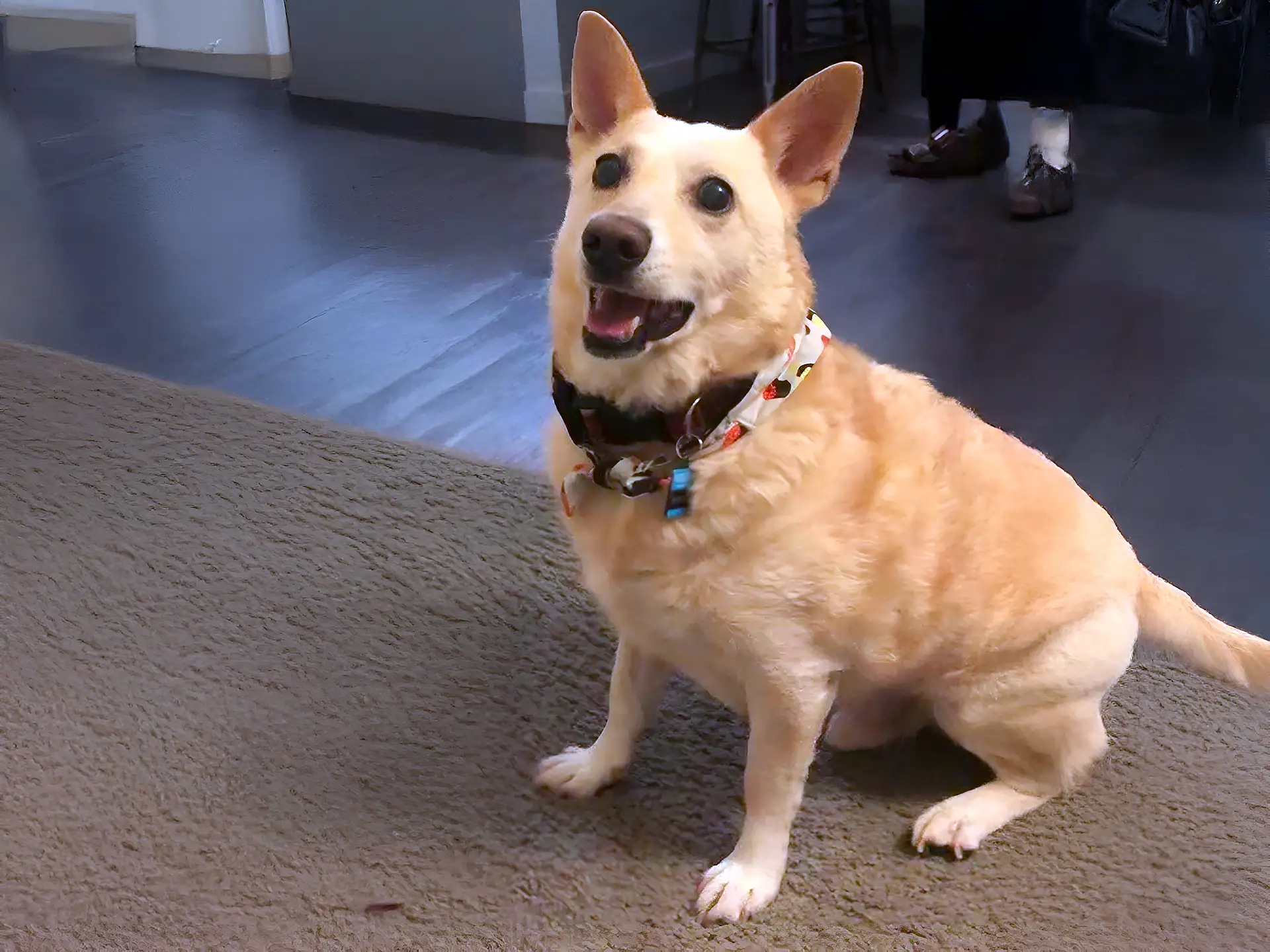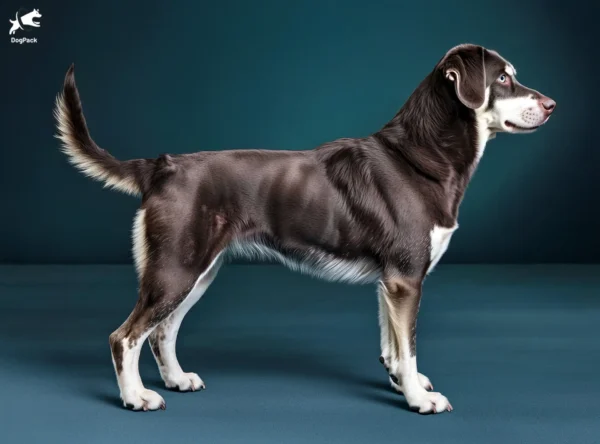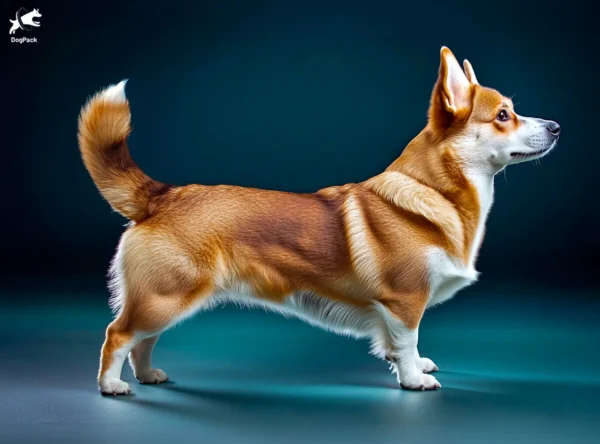Corgidor Dog Breed Info & Overview
The Corgidor, a mix of the lively Pembroke Welsh Corgi and the friendly Labrador Retriever, brings together the best of both breeds. This medium-sized hybrid is known for its playful energy and affectionate nature, making it an ideal companion for families and active individuals alike. With a blend of loyalty, fun-loving spirit, and adaptability, the Corgidor is sure to bring joy and companionship to any home.
Characteristics
Pictures
Breed History
The Corgidor is a relatively new hybrid, emerging as designer dog breeds gained popularity in recent decades. Breeders sought to combine the intelligence and friendliness of the Labrador Retriever with the spirited and compact nature of the Pembroke Welsh Corgi. The result is a versatile companion that inherits the best traits from both parent breeds.
While the exact origins of the Corgidor are unclear, it’s believed that this crossbreed first appeared in the United States in the late 20th century. As both parent breeds have rich histories—Corgis as herding dogs in Wales and Labradors as retrievers in Newfoundland—the Corgidor brings together a blend of working dog heritage.
The name “Corgidor” is a simple portmanteau of “Corgi” and “Labrador,” reflecting its mixed lineage. This hybrid hasn’t been recognized by major kennel clubs due to its crossbreed status, but it has garnered a dedicated following among those who appreciate its unique combination of traits and charming personality.
Temperament, Personality
The Corgidor is known for its friendly and outgoing personality. Combining the social nature of the Labrador with the Corgi’s playful demeanor, this hybrid is often eager to please and enjoys being the center of attention. They thrive on companionship and form strong bonds with their families.
With children, Corgidors are typically gentle and patient, making them excellent family pets. Their energetic disposition means they love to play, and they often match the enthusiasm of younger family members. Supervision is always recommended, but they generally adapt well to households with kids.
When it comes to other pets, early socialization is key. Corgidors can get along well with other dogs, especially if introduced at a young age. Their herding instincts from the Corgi side may lead them to try and herd smaller animals, so it’s important to monitor interactions with cats or small pets.
Physical Characteristics
Corgidors typically inherit a blend of physical traits from both parent breeds. They often have the elongated body and shorter legs of a Corgi, paired with the muscular build of a Labrador. This unique combination results in a medium-sized dog that’s sturdy yet agile.
The coat of a Corgidor is usually short to medium in length, dense, and can be water-resistant like the Labrador’s. Common coat colors include black, brown, tan, and combinations thereof. Some may even display the distinctive white markings characteristic of Corgis.
One of the most endearing features of the Corgidor is their expressive face, often showcasing the soulful eyes of a Lab and the perky ears of a Corgi. Their tails can vary—some have the docked tail of a Pembroke Welsh Corgi, while others have a longer tail resembling that of a Labrador.
Health Issues
Like all breeds, Corgidors can be prone to certain health issues inherited from their parent breeds. Hip dysplasia is a common concern due to their Labrador lineage, affecting mobility over time. Regular veterinary check-ups and maintaining a healthy weight can help mitigate this risk.
From the Corgi side, intervertebral disc disease (IVDD) can be a potential issue due to their longer spine and shorter legs. Preventing excessive jumping and ensuring proper support when lifting can reduce strain on their back. Awareness of this condition is crucial for owners.
Other potential health concerns include eye conditions such as progressive retinal atrophy and obesity if overfed. Providing a balanced diet, regular exercise, and routine health screenings will contribute to a Corgidor’s overall well-being and longevity.
Grooming Needs
Corgidors generally have moderate grooming needs. Their coats are typically double-layered, shedding moderately throughout the year and more heavily during seasonal changes. Regular brushing—about two to three times a week—helps manage shedding and keeps their coat healthy.
Bathing a Corgidor can be done as needed, usually every couple of months, unless they’ve had a particularly muddy adventure. Over-bathing can strip natural oils from their skin, so it’s best to keep it minimal. Use a gentle dog shampoo to maintain coat quality.
Ear care is important, especially if they inherit the Labrador’s floppy ears, which can be prone to infections. Regularly check and clean their ears to prevent buildup. Don’t forget routine dental care and nail trimming to keep your Corgidor in top shape.
Exercise Requirements
Being an active breed, the Corgidor requires regular exercise to stay healthy and happy. Aim for at least an hour of physical activity each day. This can include walks, playtime in the yard, or interactive games that stimulate both mind and body.
Corgidors enjoy activities that challenge them mentally and physically. Fetch, agility training, and obedience exercises are excellent ways to keep them engaged. Their Labrador heritage often means they love water, so supervised swimming can be a great option.
It’s important to balance exercise with caution due to their potential back issues from the Corgi side. Avoid activities that involve excessive jumping or high-impact movements. Consistent, moderate exercise will help your Corgidor maintain a healthy weight and prevent boredom.
Training Tips
Training a Corgidor can be a rewarding experience thanks to their intelligence and eagerness to please. Positive reinforcement methods work best, using treats, praise, and affection to motivate them. Early training helps establish good habits and strengthens your bond.
However, the Corgi’s independent streak might occasionally surface, leading to moments of stubbornness. Consistency and patience are key. Keep training sessions fun and engaging to hold their interest, and vary activities to prevent them from becoming bored.
Socialization is equally important for a well-rounded Corgidor. Expose them to different people, environments, and other animals from a young age. This helps curb any herding instincts and ensures they grow into confident and friendly adult dogs.
Nutrition, Diet
A Corgidor’s diet should be tailored to their age, size, and activity level. Due to their propensity for obesity, especially from the Labrador side, it’s crucial to monitor their calorie intake. Typically, they require about 2 to 2.5 cups of high-quality dry dog food per day, divided into two meals.
Choose a dog food that supports joint health, as Corgidors can be prone to hip dysplasia and back issues. Foods rich in omega-3 fatty acids, glucosamine, and chondroitin can aid in maintaining healthy joints. Consult your veterinarian for recommendations on specific brands or formulations.
Be cautious with treats and table scraps, which can quickly add extra calories. Incorporate healthy snacks like carrot sticks or apple slices in moderation. Regularly assess your Corgidor’s weight and adjust their diet accordingly to keep them at an optimal weight.
Adoption, Breeders
Finding a Corgidor may take some effort, but there are several reputable avenues to explore. Begin by connecting with breed-specific rescues or mixed-breed adoption centers, such as Adoptapet.com, which often lists hybrid breeds like the Corgidor nationwide. You may also consider local shelters, as mixed breeds frequently come up for adoption.
If adoption isn’t feasible and you’re considering a breeder, research carefully. Organizations like the Good Dog network offer guidance on ethical breeding practices and breeder referrals within the USA. A responsible breeder will be transparent, willing to provide health clearances, and committed to the well-being of both parents and puppies.
Be wary of breeders who avoid questions or offer puppies at unusually low prices, as this can signal irresponsible practices. The American Kennel Club (AKC) provides resources on ethical breeding standards and offers tips to avoid puppy mills. With diligence, you’ll find a healthy, well-adjusted Corgidor to welcome into your home.
Family Pet?
The Corgidor’s friendly and affectionate nature makes them an excellent choice for families. They often form strong bonds with all family members and enjoy participating in household activities. Their playful demeanor keeps everyone entertained.
With children, Corgidors are generally patient and tolerant, making them suitable companions for kids of all ages. They love to play and can match the energy levels of active children. Teaching kids how to interact respectfully with dogs ensures harmonious relationships.
Regarding other pets, early socialization helps a Corgidor coexist peacefully with other dogs and even cats. Their herding instincts might prompt them to nudge or chase smaller animals, so supervision and proper introductions are important to foster positive interactions.
Right For You?
If you’re an active individual or family looking for a loyal and energetic companion, the Corgidor might be the perfect fit. They thrive in environments where they receive ample exercise, mental stimulation, and affection from their owners.
Potential owners should consider the space they can provide. While Corgidors can adapt to various living situations, a home with a yard is ideal for them to burn off energy. Apartment living is possible if daily exercise needs are met.
Those prepared to invest time in training, socialization, and regular grooming will find the Corgidor a rewarding addition to their lives. Their blend of intelligence, playfulness, and affection makes them a delightful companion for the right owner.
Conclusion
Bringing a Corgidor into your home means welcoming a dog that’s full of love, energy, and personality. This hybrid combines some of the best traits of the Corgi and Labrador Retriever, resulting in a friendly and devoted companion. If you’re ready for an active lifestyle filled with playtime, training, and plenty of affection, the Corgidor could be your ideal match. They make wonderful family pets and thrive when included in daily activities. With proper care, socialization, and attention, a Corgidor will not only be a pet but a cherished member of your family.
FAQs
-
Are Corgidors hypoallergenic?
No, Corgidors are not hypoallergenic. They have a double coat that sheds moderately, which can trigger allergies in sensitive individuals. Regular grooming can help reduce shedding, but those with severe allergies might need to consider a different breed.
-
How big do Corgidors get?
Corgidors typically grow to be medium-sized dogs, weighing between 40 to 55 pounds (18–25 kg) and standing 15–23 inches (38–58 cm) tall. Their size can vary depending on which parent breed’s traits are more dominant.
-
Do Corgidors make good watchdogs?
Corgidors can be alert and may bark to announce visitors, inheriting the Corgi’s tendency to be vocal. While they are friendly, their attentiveness makes them decent watchdogs, but they may not serve as protective guard dogs due to their sociable nature.
-
What kind of environment is best for a Corgidor?
A home with a securely fenced yard is ideal for a Corgidor, providing space to play and explore. They do well in active households where they receive regular exercise and mental stimulation. They can adapt to various climates but may prefer moderate temperatures.
-
Are Corgidors easy to train?
Yes, Corgidors are generally easy to train due to their intelligence and eagerness to please. Consistent, positive reinforcement techniques yield the best results. Early training and socialization help ensure they develop into well-mannered companions.
Breed Ratings
Corgidors are highly intelligent, thanks to their smart parent breeds. They learn quickly and enjoy mental challenges.
This breed loves to play and can be quite entertaining, making them great companions for active families and children.
With a moderate to high energy level, Corgidors need regular exercise to prevent boredom and destructive behaviors.
Corgidors shed moderately year-round and more heavily during shedding seasons; regular brushing helps manage loose hair.
They generally have a low to moderate prey drive but may occasionally chase small animals due to their herding instincts.
Grooming is manageable with regular brushing; their coat maintenance isn’t overly demanding but requires consistency.
Eager to please and intelligent, Corgidors respond well to training, especially with positive reinforcement methods.
They prefer company and may experience separation anxiety if left alone for extended periods; companionship is important.
Corgidors may bark to alert their owners but are not excessively noisy; training can help manage vocal tendencies.
This breed has minimal drooling, making them suitable for owners who prefer a tidier canine companion.
Generally sociable with other dogs, especially when properly socialized from a young age; enjoy canine companionship.
They can be prone to certain health issues like hip dysplasia; regular vet care and a healthy lifestyle are important.














